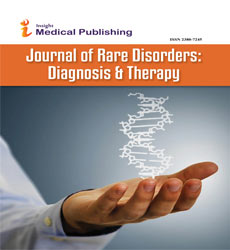Management of Pompe Disease and Treatment Options
Jamie Slowinski
Department of Pathology and Cell Biology, Columbia University, New York, USA
DOI10.36648/2380-7245.10.3.164
Jamie Slowinski*
Department of Pathology and Cell Biology, Columbia University, New York, USA
- *Corresponding Author:
- Jamie Slowinski
Department of Pathology and Cell Biology, Columbia University, New York,
USA,
E-mail: jamie@gmail.com
Received date: May 29, 2024, Manuscript No. IPRDDT-24-19488; Editor assigned date: May 31, 2024, PreQC No. IPRDDT-24-19488 (PQ); Reviewed date: June 14, 2024, QC No. IPRDDT-24-19488; Revised date: June 21, 2024, Manuscript No. IPRDDT-24-19488 (R); Published date: June 28, 2024, DOI: 10.36648/2380-7245.10.3.164
Citation: Slowinski J (2024) Management of Pompe Disease and Treatment Options. J Rare Disord Diagn Ther Vol.10 No.3: 164.
Description
Pompe disease, also known as glycogen storage disease type II or acid maltase deficiency, is a rare genetic disorder that affects the body's ability to break down glycogen, a stored form of sugar that provides energy to muscles. This condition is caused by mutations in the GAA gene, which leads to a deficiency of the enzyme acid alpha-glucosidase. Without enough GAA enzyme, glycogen builds up in cells, particularly in muscles, causing progressive damage. This disease manifests in varying degrees of severity, depending on the age of onset and the extent of enzyme deficiency. The classic infantile-onset form is the most severe and typically appears within the first few months of life. Infants with disease experience muscle weakness, poor muscle tone enlarged heart breathing difficulties and feeding problems. If untreated, it can lead to severe cardiac and respiratory complications, often resulting in death within the first year or two of life. On the other hand, late-onset pompe disease can appear anytime from childhood to adulthood. Symptoms may include progressive muscle weakness, respiratory difficulties, and in some cases, mild heart enlargement. The progression of symptoms is slower compared to the infantile form, and life expectancy can vary widely depending on the individual's specific genotype and management of the disease.
Diagnosis and genetic basis
Diagnosing disease involves a combination of clinical evaluation, genetic testing to identify mutations in the GAA gene, and enzyme activity assays to measure the levels of acid alpha-glucosidase in blood or other tissues. Genetic counseling is essential for families with a history of pompe disease or those at risk of carrying the mutated gene. The genetic basis of this disease lies in mutations that affect the production or function of acid alpha-glucosidase enzyme. These mutations disrupt the breakdown of glycogen in lysosomes, the cellular structures responsible for digestion and recycling of various substances. As a result, glycogen accumulates in tissues throughout the body, particularly in muscles, impairing their function over time. Until recently, treatment options for disease were limited. Supportive care, such as respiratory support and physical therapy, aimed to manage symptoms and improve quality of life. However, the development of Enzyme Replacement Therapy (ERT) has revolutionized the management of pompe disease, particularly the infantile-onset form. ERT involves intravenous infusion of recombinant human acid alpha-glucosidase enzyme, which helps to break down glycogen in lysosomes. Early initiation of ERT in infants with disease can significantly improve survival and reduce the severity of cardiac and skeletal muscle involvement. However, ERT is not a cure and requires lifelong administration to maintain its benefits. Despite the advancements in ERT, challenges remain in managing disease effectively, especially in late-onset forms where the disease progression can be slower and more variable. Issues such as immune response to the enzyme replacement, access to treatment, and the need for additional therapeutic approaches continue to be areas of active research.
Patient perspectives
Ongoing research efforts focus on developing more targeted therapies, improving delivery methods for ERT and exploring alternative treatment strategies such as gene therapy and substrate reduction therapy. Gene therapy holds promise for providing a more permanent solution by delivering functional copies of the GAA gene to affected cells, potentially restoring normal enzyme activity. Living with disease presents significant challenges for patients and their families. Beyond medical management, support networks, patient advocacy groups, and educational resources play vital roles in empowering individuals affected by disease. These resources provide information, emotional support, and opportunities to participate in clinical trials and research initiatives aimed at advancing treatment options and understanding the disease better. Pompe disease is a complex genetic disorder that affects muscle function due to deficiency in the acid alpha-glucosidase enzyme. While advancements in enzyme replacement therapy have transformed outcomes for many patients, ongoing research is essential to address remaining challenges and new therapeutic avenues. With continued efforts in research, diagnosis and patient support, there is hope for further improving the quality of life and long-term outcomes for individuals living with Pompe disease.
Open Access Journals
- Aquaculture & Veterinary Science
- Chemistry & Chemical Sciences
- Clinical Sciences
- Engineering
- General Science
- Genetics & Molecular Biology
- Health Care & Nursing
- Immunology & Microbiology
- Materials Science
- Mathematics & Physics
- Medical Sciences
- Neurology & Psychiatry
- Oncology & Cancer Science
- Pharmaceutical Sciences
